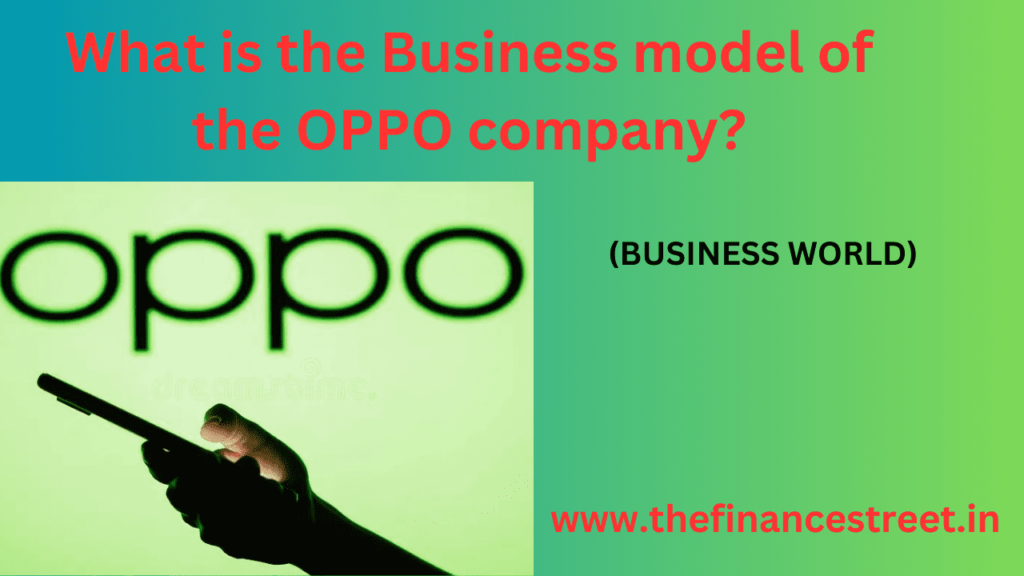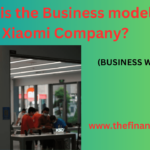Table of Contents
ToggleIntroduction –
Oppo, a trailblazer in the global smartphone market, operates under a business model characterized by its relentless pursuit of innovation and commitment to delivering cutting-edge technology. Founded in 2004, Oppo has evolved into a major player, with a diverse product portfolio that caters to a broad spectrum of consumer needs. At the heart of Oppo’s success lies a strategic focus on staying ahead of industry trends, particularly in the realms of camera technology and design, which has allowed the company to carve a distinctive niche in an intensely competitive market.
Central to Oppo’s business model is its dedication to global expansion. The company has strategically entered various international markets, adapting its products to suit the unique preferences and demands of diverse consumer bases. Oppo’s success is not only defined by its innovative devices but also by its robust marketing and branding efforts. Through strategic collaborations with influencers, celebrities, and engaging promotional activities, Oppo has built a strong brand presence, fostering widespread consumer awareness and loyalty.
Oppo’s commitment to sustainability adds another layer to its business model, aligning with the growing emphasis on environmentally conscious practices. As the company continues to adapt to the ever-evolving landscape of the smartphone industry, its multi-faceted approach, encompassing technological innovation, global expansion, marketing excellence, and environmental responsibility, positions Oppo as a dynamic force in the realm of mobile technology.
What is the Business model of OPPO company?
As Oppo, like many other smartphone manufacturers, operates on a business model that includes several key elements. Please note that specific details of a company’s business model can evolve over time, so it’s always a good idea to check the latest reports for the most current information. Here are some aspects of Oppo’s business model:
- Smartphone Sales: Oppo primarily generates revenue through the sale of smartphones. The company offers a range of devices targeting different market segments, from budget-friendly options to premium flagship models.
- Product Diversification: Oppo has a diversified product portfolio that includes not only smartphones but also other electronic devices and accessories. This diversification allows the company to tap into various consumer needs and preferences.
- Innovation and Technology: Oppo focuses on innovation and technological advancements in its products, especially in camera technology and features. This emphasis on innovation helps attract tech-savvy consumers looking for the latest and most advanced features.
- Marketing and Branding: Oppo invests significantly in marketing and branding to create awareness and establish a strong brand presence. This includes advertising campaigns, sponsorships, and collaborations with influencers or celebrities to enhance the brand image.
- Global Expansion: Oppo has pursued an international expansion strategy, entering various markets worldwide. This approach allows the company to access a broader customer base and mitigate risks associated with dependence on a single market.
- Partnerships and Collaborations: Oppo collaborates with other companies in the tech industry to enhance its products and services. This can include partnerships with software developers, camera technology specialists, or other entities that contribute to the overall quality of Oppo’s offerings.
- Offline and Online Sales Channels: Oppo sells its products through a combination of offline and online channels. This includes partnerships with retailers, carrier agreements, and the availability of products through e-commerce platforms.
It’s important to note that business models can evolve, and companies may adapt their strategies based on market trends, competition, and other factors. For the latest and most accurate information about Oppo’s current business model, it is recommended to refer to the company’s official publications and financial reports.
What is the OPPO’s success journey as a Global company?
Oppo’s success as a global company has been characterized by a combination of factors, including strategic business decisions, innovative product offerings, effective marketing, and a focus on customer preferences. Here is an overview of Oppo’s success journey:
- Establishment and Early Growth (2004-2010): Oppo was founded in 2004 in China and initially focused on manufacturing MP3 and DVD players. The company gradually expanded its product line to include smartphones. In the early years, Oppo gained recognition for its commitment to quality and innovation.
- Entry into the Smartphone Market (2011-2014): Oppo entered the smartphone market and gained attention with its high-quality devices. The company distinguished itself by placing a strong emphasis on design and camera technology. Oppo’s early smartphones gained popularity in the domestic market and laid the foundation for its global expansion.
- International Expansion (2014-2016): Recognizing the potential of the global smartphone market, Oppo initiated its international expansion strategy. The company targeted key markets in Asia, Europe, and other regions. Investments in marketing, brand building, and establishing partnerships with retailers and carriers played a crucial role in Oppo’s successful entry into new markets.
- Innovation and Camera Technology (2016-2018): Oppo gained a reputation for innovation, particularly in the area of camera technology. The company introduced features such as motorized pop-up cameras and advancements in selfie technology, catering to consumers who prioritized photography capabilities in smartphones.
- Focus on Emerging Markets and Mid-Range Segment (2018-2020): Oppo strategically targeted emerging markets and the mid-range smartphone segment. The company launched a series of devices with competitive specifications at various price points, appealing to a broad spectrum of consumers. This approach contributed to increased market share and brand visibility.
- Global Partnerships and 5G Leadership (2020-2022): Oppo continued to strengthen its global presence through strategic partnerships and collaborations. The company also focused on 5G technology, launching smartphones that supported the next-generation network. This emphasis on cutting-edge technology positioned Oppo as a player at the forefront of the mobile industry.
- Diversification and Ecosystem Development: In addition to smartphones, Oppo diversified its product portfolio to include other consumer electronics, such as smartwatches, audio devices, and accessories. This move aligned with the broader trend of companies building ecosystems of interconnected devices.
- Adaptation to Market Trends: Oppo demonstrated agility in adapting to changing market trends and consumer preferences. The company actively incorporated feedback, embraced new technologies, and adjusted its product strategies to meet evolving demands.
Oppo’s success as a global company can be attributed to its ability to combine technological innovation, a focus on design, effective marketing, and a commitment to meeting diverse consumer needs. By staying responsive to market dynamics and continuously evolving its product offerings, Oppo has carved a significant niche for itself in the competitive smartphone industry.
What are the subsidiaries of OPPO company?
As Oppo, being a part of BBK Electronics Corporation, has several subsidiaries. BBK Electronics is a Chinese multinational conglomerate that owns multiple consumer electronics brands. Oppo itself operates as a subsidiary under BBK Electronics. Here are some of the notable subsidiaries associated with Oppo:
- OnePlus: OnePlus is a subsidiary of Oppo and operates independently. It is known for producing high-end smartphones with a focus on providing flagship-level features at competitive prices.
- Realme: Realme is another subsidiary of Oppo, and it was originally established as a sub-brand of Oppo. Realme focuses on offering budget and mid-range smartphones with competitive specifications.
- Vivo: While not a direct subsidiary of Oppo, both Oppo and Vivo are part of the same parent company, BBK Electronics. Vivo is another prominent smartphone manufacturer that competes in the global market.
These subsidiaries operate somewhat independently, with each brand having its own product lineup, marketing strategies, and target audience. However, they share certain resources and technologies as part of the larger BBK Electronics Corporation.
Please note that the structure of multinational corporations can evolve, and new subsidiaries or changes in ownership structures may occur. For the most up-to-date and accurate information, it is recommended to refer to the latest corporate reports or official announcements from Oppo and its parent company, BBK Electronics.
What is the business strategies of OPPO Company?
As Oppo, like other successful companies, employs a combination of business strategies to compete in the global smartphone market. Here are some key elements of Oppo’s business strategies:
- Innovation and Technology: Oppo places a strong emphasis on innovation, especially in camera technology. The company invests in research and development to introduce new features and improvements in its smartphones, staying competitive in the rapidly evolving mobile industry.
- Product Diversification: Oppo has a diversified product portfolio that includes a range of smartphones catering to different market segments. This includes flagship models, mid-range devices, and budget-friendly options. Diversification helps Oppo address a broad spectrum of consumer needs.
- Global Expansion: Oppo has pursued an international expansion strategy, entering markets beyond its home country, China. The company establishes a presence in key regions, tailoring its products to meet the preferences and demands of diverse consumer markets.
- Marketing and Branding: Oppo invests heavily in marketing and branding to build a strong global presence. The company collaborates with influencers, celebrities, and other promotional channels to create awareness and enhance the perceived value of its products.
- User-Centric Approach: Oppo focuses on understanding and meeting user needs. This involves gathering feedback from consumers and incorporating it into product development. The user-centric approach helps Oppo create smartphones that align with customer preferences.
- Offline and Online Sales Channels: Oppo utilizes a mix of offline and online sales channels. The company partners with retailers and carriers for offline sales while making its products available through e-commerce platforms. This omnichannel approach ensures broad market reach.
- Strategic Partnerships: Oppo collaborates with other companies in the tech industry to enhance its products. This can involve partnerships with camera technology specialists, software developers, or other entities that contribute to the overall quality and features of Oppo’s devices.
- Customer Service and After-Sales Support: Providing excellent customer service and after-sales support is a key component of Oppo’s strategy. Ensuring customer satisfaction contributes to brand loyalty and positive word-of-mouth marketing.
- Adaptation to Market Trends: Oppo remains agile in adapting to emerging market trends. The company keeps a close eye on technological advancements, consumer preferences, and industry shifts, adjusting its strategies and product offerings accordingly.
- Sustainability Initiatives: Like many modern companies, Oppo has shown an increasing interest in sustainability. This involves incorporating eco-friendly practices into its operations and product design, addressing environmental concerns.
It’s important to note that business strategies can evolve over time, and the competitive landscape can change. For the latest and most accurate information about Oppo’s current business strategies, it is recommended to refer to the company’s official publications, financial reports, and recent announcements.
What is the business in India of OPPO Company?
As Oppo has a significant presence in the Indian market and operates a variety of business activities in the country. Here are some key aspects of Oppo’s business in India:
- Market Presence: Oppo is a prominent player in the Indian smartphone market, competing with other major brands. The company has established itself as one of the leading smartphone manufacturers in the country.
- Product Portfolio: Oppo offers a diverse range of smartphones in India, catering to different consumer segments. This includes flagship models with advanced features, mid-range devices, and budget-friendly options. Oppo regularly launches new models to stay competitive and address the evolving needs of Indian consumers.
- Offline and Online Sales: Oppo has a robust distribution network in India, with a presence in both offline and online retail channels. The company’s smartphones are available through authorized retailers, multi-brand outlets, and e-commerce platforms, ensuring wide accessibility for consumers.
- Retail Partnerships: Oppo has established partnerships with various retail chains and mobile phone stores across India. These partnerships help enhance the availability of Oppo smartphones and provide consumers with hands-on experiences through physical retail outlets.
- Manufacturing Facilities: Oppo has invested in manufacturing facilities in India as part of the government’s “Make in India” initiative. This allows Oppo to locally produce smartphones, contributing to job creation and supporting the Indian economy.
- Marketing and Branding: Oppo places a significant emphasis on marketing and branding activities in India. The company engages in promotional campaigns, sponsorships, and collaborations with Indian celebrities to enhance brand visibility and connect with the local audience.
- Service and Support: Oppo has established a service network in India to provide after-sales support for its products. This includes service centers across major cities to address customer queries, perform repairs, and offer warranty services.
- Community Engagement: Oppo engages with the Indian community through various initiatives. This may include community events, sponsorships of local events, and social responsibility programs aimed at giving back to society.
- Adaptation to Local Preferences: Oppo adapts its product strategies to align with local preferences and market trends in India. This can involve customizing features, designs, and marketing approaches to resonate with Indian consumers.
It’s important to note that business strategies and market dynamics can evolve, and the information provided is based on the situation as of my last knowledge update in January 2022. For the latest and most accurate information about Oppo’s business in India, it is recommended to refer to the company’s official communications, press releases, and recent announcements.
Critical Analysis of business model of OPPO Company?
A critical analysis of Oppo’s business model reveals several strengths that have contributed to its success, but it also highlights areas where challenges and potential improvements may exist.
Strengths:
- Innovation and Differentiation: Oppo’s commitment to innovation, especially in camera technology and design, sets it apart in a crowded market. The company’s ability to introduce unique features, such as motorized pop-up cameras and advancements in selfie technology, has helped create a distinct brand identity.
- Global Expansion Strategy: Oppo’s strategic approach to international markets has been a strength. By adapting its products to diverse consumer preferences and establishing a strong global presence, Oppo has expanded its market share beyond its home country of China.
- Diversified Product Portfolio: Oppo’s diversified product portfolio, spanning flagship, mid-range, and budget-friendly smartphones, allows the company to cater to a broad spectrum of consumers. This adaptability contributes to sustained revenue streams across various market segments.
- Marketing and Branding Excellence: Oppo’s marketing strategies, including collaborations with influencers and celebrities, have been effective in creating brand awareness. The company’s investment in branding has contributed to its recognition as a leading player in the smartphone industry.
- Customer-Centric Approach: Actively seeking customer feedback and incorporating it into product development demonstrates Oppo’s commitment to meeting consumer needs. This customer-centric approach fosters brand loyalty and positive relationships with users.
Areas for Consideration:
- Competitive Pricing: While Oppo offers smartphones with competitive features, pricing strategies may need careful consideration. In markets with intense competition, especially in the mid-range segment, finding the right balance between features and price is crucial.
- Sustainability Integration: Although Oppo has shown interest in sustainability, there is room for the company to further integrate eco-friendly practices into its entire product lifecycle. This could include using more sustainable materials, reducing environmental impact during manufacturing, and implementing recycling programs.
- Continued Innovation: In a fast-paced industry, sustaining a competitive edge requires continuous innovation. Oppo needs to ensure that its R&D efforts remain cutting-edge, anticipating and addressing emerging technological trends to stay ahead of competitors.
- Evolving Consumer Preferences: As consumer preferences evolve, particularly in terms of environmental concerns and privacy considerations, Oppo must stay attuned to these changes. Adjusting its business model to align with evolving societal expectations is crucial for long-term success.
In conclusion, Oppo’s business model has demonstrated resilience and adaptability, allowing the company to thrive in a competitive industry. By addressing areas for consideration, such as pricing strategies, sustainability practices, and ongoing innovation, Oppo can further strengthen its position and continue to shape the future of the mobile technology landscape.
Conclusion –
In conclusion, Oppo’s business model stands as a testament to the company’s strategic agility and commitment to excellence in the dynamic landscape of the smartphone industry. By placing a premium on innovation, Oppo consistently pushes the boundaries of technology, particularly in areas such as camera advancements and design aesthetics.
The company’s global expansion strategy underscores its ambition to connect with diverse consumer markets, tailoring its products to meet the specific needs of each region. Moreover, Oppo’s success is augmented by a robust marketing engine, building a brand that resonates globally through collaborations and promotional efforts.
The emphasis on a customer-centric approach, demonstrated through active engagement and the incorporation of user feedback, highlights Oppo’s dedication to meeting the evolving preferences of its consumers. Additionally, the company’s commitment to sustainability reflects a forward-thinking perspective in an era where environmental consciousness is paramount.
As Oppo continues to navigate the challenges and opportunities within the industry, its multi-faceted business model, blending innovation, global presence, marketing finesse, and sustainability, positions the company as a key influencer and contributor to the evolving narrative of mobile technology.



